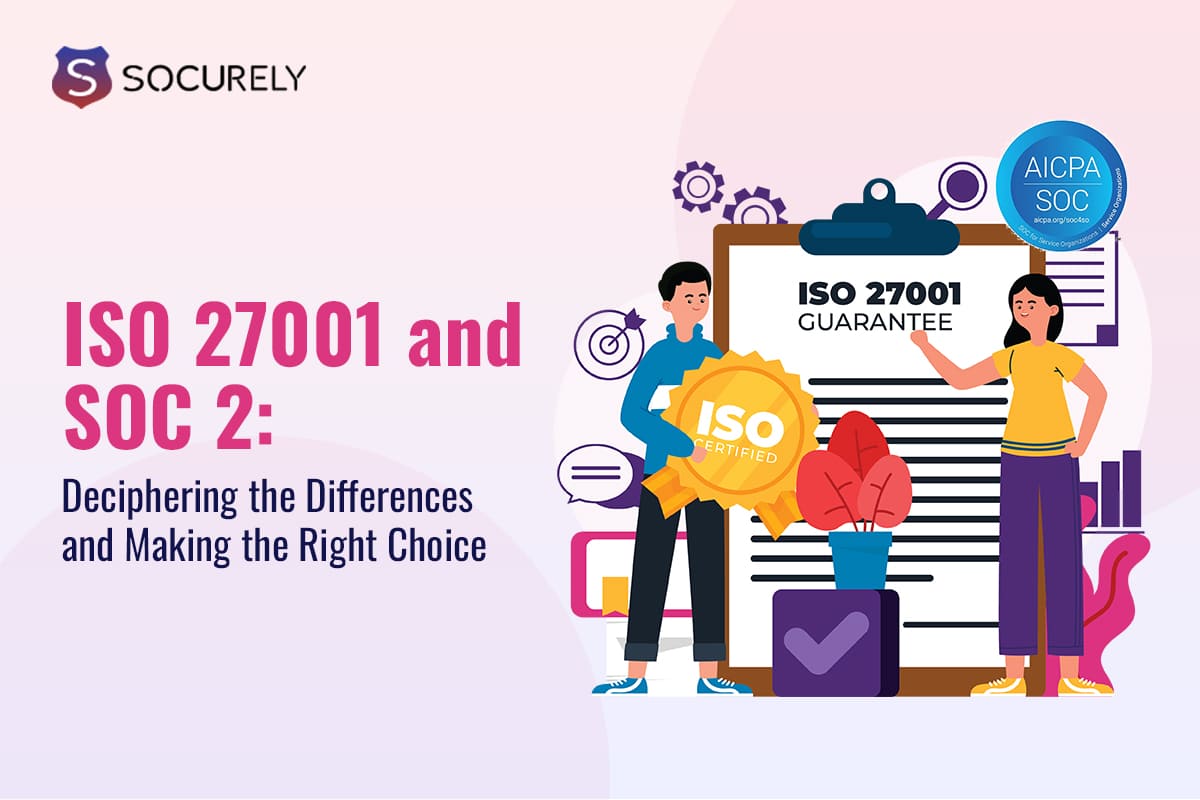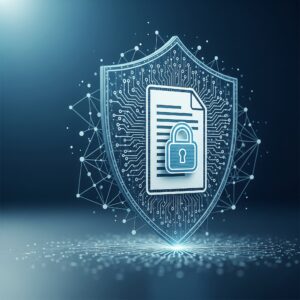In the digital age, where data reigns supreme and information security is paramount, adhering to recognized standards and frameworks has never been more critical. Two commonly discussed but often misunderstood compliance standards are SOC 2 and ISO 27001 Compliance.
In this comprehensive guide, we will delve into what these standards entail, highlight their differences, and guide you on choosing the one that aligns best with your organizational needs. So, let’s embark on the journey to understand ISO 27001 and SOC 2, their distinctions, and the factors influencing your choice.
Understanding ISO 27001 Compliance
ISO 27001 is a globally acknowledged benchmark for managing information security systems (ISMS). It offers a systematic approach to managing sensitive information, ensuring its confidentiality, integrity, and availability. ISO 27001 provides a rigorous framework for identifying, managing, and mitigating security risks. It encompasses:
- Risk Assessment: ISO 27001 prioritizes the evaluation of potential risks. Organizations are required to identify and evaluate risks to their information assets. This includes assessing potential threats, vulnerabilities, and the potential impact of security incidents.
- Continuous Improvement: The ISO 27001 Compliance framework promotes an ongoing cycle of improvement. It requires organizations to regularly review and update their security controls and practices to adapt to evolving threats and vulnerabilities.
- Broad Applicability: ISO 27001 is broad in its applicability and can be implemented by organizations of any size and in various industries. Its primary focus is on managing and mitigating information security risks.
The SOC 2 Compliance Framework
The SOC 2, which stands for System and Organization Controls 2, is a compliance framework developed by the American Institute of CPAs (AICPA). It focuses on the security, availability, processing integrity, confidentiality, and privacy of customer data at service organizations. SOC 2 reports are specifically tailored to examine the controls at service organizations that could impact the security and privacy of client data. The SOC 2 framework encompasses:
- Specific Control Criteria: Unlike ISO 27001, which offers a more generalized approach to information security, SOC 2 has specific control criteria for different categories. These criteria encompass aspects such as security, accessibility, processing integrity, confidentiality, and privacy.
- Service Organization Focus: SOC 2 is designed for service organizations that provide services where customer data is a critical consideration. It is often sought by cloud service providers, data centers, SaaS companies, and others that store and process customer information.
- Customer Trust: SOC 2 reports are typically used to assure customers that their data is handled securely by the service organization. It’s a common requirement for service providers to build trust with their clients.
The Key Differences
- Scope of Applicability:
- ISO 27001: This standard is broad and can be applied to any organization, regardless of its size, industry, or the nature of the services it provides. ISO 27001 places significant emphasis on risk assessment and information security.
- SOC 2: SOC 2, on the other hand, is primarily directed at service organizations. It focuses on assessing and reporting controls that are relevant to the security, availability, processing integrity, confidentiality, and privacy of data processed at these service providers.
2.Audience and Purpose:
- ISO 27001: ISO 27001 is more suitable for organizations looking to establish a comprehensive information security management system. Its audience is broad, including businesses in various sectors.
- SOC 2: SOC 2 is designed to assure clients and stakeholders about the effectiveness of controls at service organizations. It is particularly relevant for businesses offering services that involve the storage and processing of customer data.
3.Certification vs. Report:
- ISO 27001: Organizations can become ISO 27001 certified, meaning that they have formally met all the requirements of the standard. Certification offers a clear indication of a company’s commitment to information security.
- SOC 2: SOC 2 results in a report, which is a description of the service provider’s controls and an independent auditor’s opinion on the effectiveness of these controls. SOC 2 reports are not certifications but provide valuable insights into a service provider’s security controls.
4. Scope and Specificity:
- ISO 27001: ISO 27001 provides a holistic approach to information security and risk management, with a broad set of controls that can be customized by organizations based on their needs.
- SOC 2: SOC 2 is more specific and prescriptive, with defined criteria for security, availability, processing integrity, confidentiality, and privacy. Organizations must adhere to these criteria to be SOC 2 compliant.
5. Applicability to Industry:
- ISO 27001: Suitable for organizations across various industries, as it provides a flexible framework for securing information assets.
- SOC 2: Primarily intended for service organizations that handle customer data. It is not as versatile in its application as ISO 27001.
Which One Should You Choose?
The choice between ISO 27001 and SOC 2 largely depends on your organization’s goals, the nature of your services, and the expectations of your clients. Here are some considerations to help you decide:
If your primary concern is creating a robust information security management system that encompasses all aspects of your business and demonstrates a commitment to security, ISO 27001 is the way to go.
If your organization provides services involving customer data, such as SaaS providers, data centers, or managed IT service providers, your clients may prefer or require SOC 2 compliance. SOC 2 provides specific assurance related to data security and processing integrity.
In some cases, your organization may benefit from both ISO 27001 and SOC 2 compliance, as they serve different purposes and address distinct aspects of information security and controls.
Final Thoughts
ISO 27001 and SOC 2 are essential compliance standards that address information security and controls from different perspectives. ISO 27001 provides a comprehensive framework for establishing an information security management system, while SOC 2 focuses on the specific controls and practices of service organizations that process customer data.







